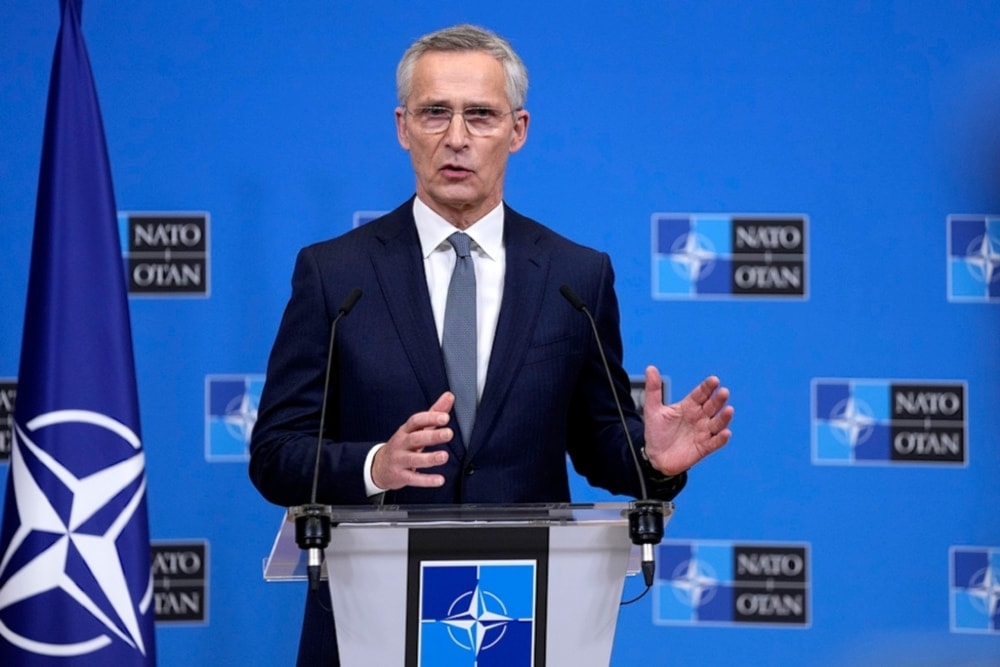Arms delivery failures, delays 'dented' Ukraine's trust in NATO: Chief
Jens Stoltenberg emphasizes the need to overhaul the coordination of international military assistance to Kiev in light of failures in weapons delivery.
-

NATO Secretary-General Jens Stoltenberg addresses a media conference at NATO headquarters in Brussels on Wednesday, February 7, 2024. (AP)
NATO Chief Jens Stoltenberg stated on Tuesday, as he departed Ukraine by train following a day-long visit, that delays and failures in arms delivery have eroded Kiev's trust in its NATO allies, Reuters reported.
Stoltenberg emphasized the need to overhaul the coordination of international military assistance to Kiev in light of these shortcomings.
"We need a more robust, institutionalized framework for our support to ensure predictability, to ensure more accountability and to ensure burden-sharing," said Stoltenberg, the secretary-general of the transatlantic military alliance.
Stoltenberg highlighted examples of NATO allies falling short of promises, including the US Congress taking six months to pass a $60-billion Ukraine aid package and European countries delivering significantly less artillery ammunition than pledged. These failures significantly affected the battlefield dynamics, allowing Russia to seize the initiative while Ukrainian forces, lacking sufficient ammunition, were pushed onto the defensive.
"Of course, the fact that we have not delivered what we promised has put a dent ... into the trust," Stoltenberg stressed.
Following discussions with Ukrainian President Volodymyr Zelensky and other senior officials, Stoltenberg conveyed that despite the challenges, Kiev maintains faith in its allies, asserting that the responsibility now lies with them to fulfill their commitments.
Stoltenberg, a former prime minister of Norway, suggested that to prevent future shortages in military aid to Ukraine, NATO should assume a more prominent coordinating role and develop a multi-year plan outlining the contributions expected from each member.
He presented this proposal to NATO's 32 members, emphasizing the need for substantial financial support. Diplomats have discussed a potential commitment of 100 billion euros ($107 billion) over five years.
"That will make it easier to plan. It will make it clear what each and every ally is expected to deliver," Stoltenberg said as quoted by Reuters.
"And NATO can then play a bigger role in ensuring allies actually deliver what they have announced," he stressed.
Dive deeper
Currently, Western military assistance to Ukraine is coordinated ad-hoc through the US-led Ukraine Defense Contact Group, also known as the Ramstein group. Earlier this month, NATO members authorized military planners to begin work on Stoltenberg's proposal, although some governments have voiced reservations. Hungary stated its opposition to anything that could escalate NATO's involvement in the war, and some diplomats have questioned the feasibility of a significant increase in financial commitments.
Stoltenberg argued that such action would represent a worthwhile investment in the security of NATO members themselves. He emphasized that the expenditure would amount to mere fractions of what the United States and its allies had spent in Iraq and Afghanistan.
"There we speak about trillions and ... in Ukraine, we are speaking about billions," he said.
"But we are actually addressing a real challenge for our security – a more aggressive Russia," he further claimed.
It is worth noting that Stoltenberg also encounters the challenge of convincing Ukraine that transitioning to NATO-led coordination would benefit its interests. During a press conference alongside Stoltenberg on Monday, Zelensky commended the Ramstein group and emphasized that Ukraine sought assurance that any new financial commitment would not divert funds from NATO members' direct bilateral aid to Kiev.
Read next: Many to question Zelensky's legitimacy 'very soon': Kremlin

 3 Min Read
3 Min Read









